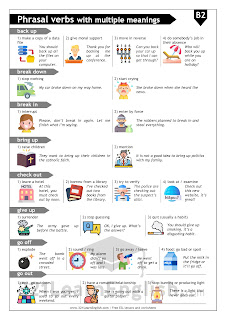Phrasal verbs are an essential part of everyday English, but they can be confusing—especially when the same phrasal verb has multiple meanings! For example, "take off" can mean to remove clothing ("Take off your jacket"), or for a plane to leave the ground ("The plane took off at noon").
Understanding these different meanings is key to sounding more natural in English. In this post, we’ll explore some common phrasal verbs with multiple meanings, explain their uses, and provide examples to help you remember them. Let’s dive in!
The vocabulary included in the PDF is the following:
back up
1) make a copy of a data file
You should back up all the files on your computer.
2) give moral support
Thank you for backing me up at the conference.
3) move in reverse
Can you back your car up so that I can get through?
4) do somebody’s job in their absence
Who will back you up while you are on holiday?
break down
1) stop working
My car broke down on my way home.
2) start crying
She broke down when she heard the news.
break in
1) interrupt
Please, don’t break in again. Let me finish what I’m saying.
2) enter by force
The robbers planned to break in and steal everything.
bring up
1) raise children
They want to bring up their children in the catholic faith.
2) mention
It is not a good idea to bring up politics with my family.
check out
1) leave a hotel
At this hotel, you must check out by noon.
2) borrow from a library
I’ve checked out two books from the library.
3) try to verify
The police are checking out the suspect’s alibi.
4) look at / examine
Check out this new website, it’s great!
give up
1) surrender
The army gave up before the battle.
2) stop guessing
OK, I give up. What’s the answer?
3) quit (usually a habit)
You should give up smoking, it’s a disgusting habit.
go off
1) explode
The bomb went off in a crowded street.
2) sound / ring
My alarm didn’t go off and I was late.
Check the whole list on the PDF.



















